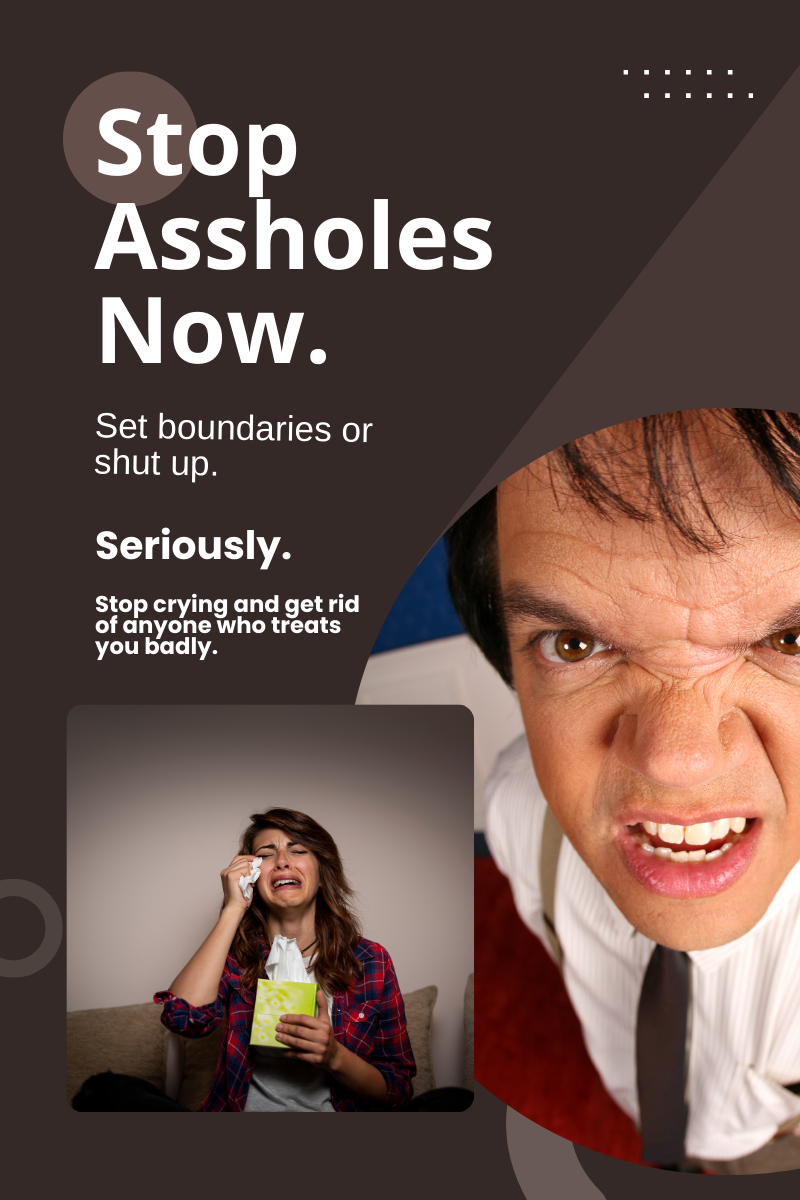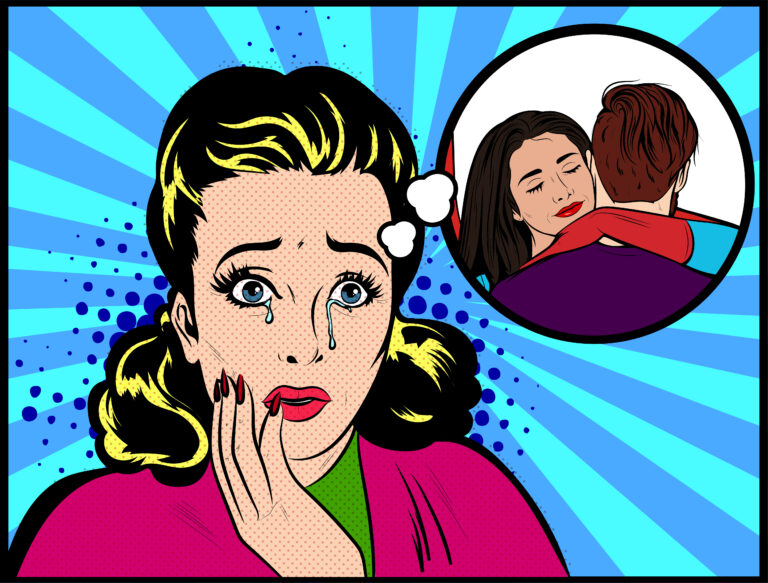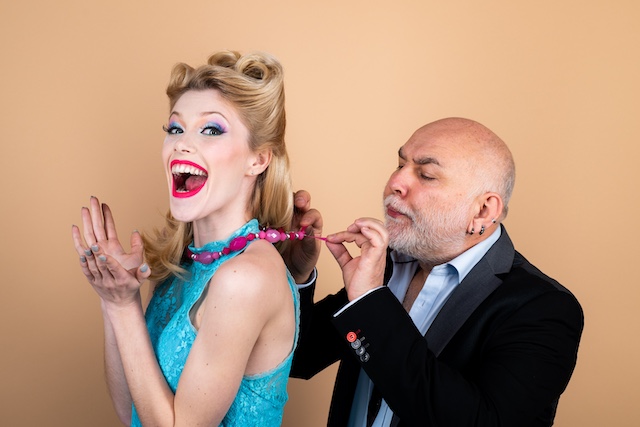Women: It’s Your Fault Men Are Jerks and Assholes.

Assholes come in all genders. We could stop it if we wanted.
We could stop people from acting like jerks and treating us with disrespect if we valued ourselves enough to set appropriate boundaries. The way it ought to be is that bad behavior should never have a positive payoff. The only reason people can get away with less-than behavior is that we allow it.
Like beasts of burden, too many tolerate the intolerable and bestow benefits of love, friendship, and relationship on those who treat us terribly and with impunity. People complain in therapy sessions about the different ways people offend them with words and deeds, yet they repeatedly go back to the trough. What does a therapist do with that?
“Hey, why don’t you set a firm boundary or end that relationship?
“Uh, well, I know I should, but …”
I have a fantasy I tell clients about when they continue to be a danger to themselves in relationships: I have a luxurious jail in my house. I pick up my self-sabotaging clients, put them in jail without the Internet or electronic devices, and visit them daily with lessons in self-esteem, boundaries, what a healthy relationship is, and all about healthy human behavior. I do guided meditations, having them visualize a new life with people who are kind and respectful. In the end, the cycle of bad decisions and self-abuse is broken, and they are released.
Although the fantasy is nice, I deal with life’s realities. I typically see horses drawn to the irresistible sweet taste of a poisonous grain: human beings return to unhealthy relationships, telling themselves the lie that things will be different one day. The offender might be a co-worker, friend, acquaintance, parent, sibling, or family member, or someone we are dating or in a long-term relationship with. We gripe to our friends and therapists about the crimes inflicted on us, but little ever changes. Why do humans do this?
There are several reasons, of course. Here are the main ones I see:
1. Low self-esteem. Maybe I am the cause of it. Maybe I am unlovable and don’t deserve to be respected.
2. Lack of confidence and Inability to set boundaries. I’m afraid I won’t have anyone if I set a boundary or stand up for myself.
3. Unhealthy attachment. I won’t have anyone if I make any demands.
4. Inability to discern reality accurately. I seem to be the common denominator in all of these terrible situations.
5. Denial. It’s not that bad. They have good intentions and don’t really mean to be hurtful.
Denial is common in our culture. Some people don’t want to, or will not accept, the truth of what is happening right before their eyes. There is a brain disconnect. Once a person decides that the person they know is Person A, an idealized form of human viewed through a rose-colored lens, getting them to see otherwise is difficult. People can’t be healthy individually or in relationships unless they can discern reality clearly and accurately. All humans are flawed and mistake-makers. If you are an adult and put anyone on a pedestal or find yourself in an intoxicating fantasy about who your potential partner or partner is, then you can be sure you have this problem.
If I were reading this blog, I would check myself in the five areas above, and if I fell short in any of them, I would work to change. Unfortunately, people are pretty lackadaisical about preparing themselves for life and the struggle of surviving in a world where so many people do not have our best interests at heart. I keep hoping that will change. Collectively, we could end most disrespectful and bad behavior by leaving people who act like that to their own devices and out in the cold. It is Psychology 101 to understand that bad behavior should never be rewarded, yet many of my clients bestow all kinds of rewards on those who treat them terribly.
Over the years, I’ve noticed it takes a long time for a person to realize how unhealthy a relationship is and another long time to take action and stop tolerating it — if it ever happens. Some people sit in the muck of a relationship they know is unhealthy for many years, hoping that one day, things will be different than they have almost always been. I’m not sure I’d even have a job if people didn’t continue to hang around disrespectful, immature, self-absorbed, and nasty-behaving people.
The excuses I hear for staying are:
- It was wonderful in the beginning; I just keep hoping that it’ll go back to how it was.
- They really are wonderful, but …
- They promise they’ll change, they’ll be good for a couple of days, then things fall back to how they were. If only …
- They say they wouldn’t have to act that way if I weren’t the way I am.
- They always ask me to help them out and say I owe them.
- Maybe it’s me, maybe I am the reason for all the problems.
- I can’t leave this job or go to the boss to complain because of x, y, z.
I’ve got some news for everyone. Relationships aren’t supposed to drag us down or cause us pain. A good one is relatively smooth, easy, and chaos-free. My policy for these situations is simple: Disrespect me once, and I may give you the benefit of the doubt, depending on what you did. Disrespect me twice, and we’re done. With this policy in place, my world stays pretty peaceful.
I often use my own marriage as an example for clients. I can’t tell you once in the 14 years I have known my husband that he has been unkind or disrespectful. We definitely disagree about things, but we usually laugh and tease as we do, and neither of us takes ourselves too seriously. That is how it is supposed to be, but I do understand that it is rare, and it is rare because people don’t make a stand for healthy behavior when unhealthy things start to occur. I dated a lot in the 10 years I was single and quickly walked away when I saw red flags. I had a zero-tolerance for baloney and bull policy, and I was going to have a great romantic relationship or no relationship. I had to be okay with periods of aloneness, which I was.
With my husband, I never saw one red flag; one of the reasons I chose him as a mate is because he was solid, mature, reliable, and integrity-filled from day one, and he remains that way. There was never doubt, flakiness, or hemming and hawing, and I would have ended it if there had been. Finding a good man or woman and having a serious relationship that is solid is possible if you are patient and discerning.
Continue to reward obnoxious jerks, inconsiderate assholes, users, and manipulators with your precious time and attention, and what happens next is on you. Keeping these bad girls or rotten egg boys in your life and continuing to complain about it without proactive action is as dysfunctional as it gets. Hanging around friends who gossip about you, create drama and chaos, and aren’t loyal is a no-brainer — give them the relational ax. If you’re like me, you have limited time for friendships, so I make sure the ones I spend it with are solid, honoring people.
My clients are the most intelligent, multi-talented, hard-working, successful, amazing people, and yet I watch them return to on-again, off-again relationships that obviously aren’t working and will never work. Extreme, unpredictable moods? No, thank you. Judgy, preachy, critical, up-in-your-business, nosy, ne’er do wells? Uh, no. Maya Angelou famously told Oprah that when people show you who they are, why won’t you believe it?
My client Jennifer has been returning to the most ridiculous man in the southwestern United States over and over again. She’s better than this, I tell her. He’s not on your level, mentally and emotionally.
“When we’re good, we’re really good,” she says as I wince. “Anyway, maybe I just need to settle because I can’t find anyone better.”
No, no, never. Never settle or sell yourself short in relationships. Have standards, and walk away when people begin to show a pattern of breaking them. Clients who continue to avail themselves to known abusers always have that bottom-line self-sabotaging statement that keeps the toxic relationship going. It took me eons to learn to walk away from nonsense like that and a lot of suffering in between, and I hope that all my wonderful clients get there sooner rather than later. Why do I implore you to get there sooner or later? Because we want to end the madness of ridiculous behaving people altogether. If people like Jen’s sometime beau ended up alone because of his moody, critical nature, he would have to change or live alone, and either is fine with me.
The Jerks in Our Biological Families.
I understand that things can be more difficult with a biological family. In my own family, like many people, I allowed more leeway for disrespect because of the lifelong attachment and everyday experiences and traumas we and all families share. Giving your family of origin every chance before giving up is common, and I hung on to mine until my 60s. Still, their disrespect and abuse increased over time, and the pain I felt outweighed any benefit, so I finally cut ties. I don’t miss them and have never regretted it.
The most important thing to understand with our biological families is that we are not obligated to help, show up, keep them abreast of what we’re doing, or do anything else. Once we grow up, we have the choice to stay involved or not and how much we stay involved. This subject is a common topic with numerous clients who have been through awful things with their blood relatives yet continue to expose themselves to it.
One of my clients once was telling me in the same sentence how, as a child, her parents would haul off and slap her in the face for no apparent reason, and ended the statement with how wonderful they are.
“Hmm, I said, they don’t sound wonderful to me.”
She looked puzzled and suddenly realized what she was saying. She was a busy woman in her 40s with a career and family, and she had been inconveniencing herself for years to meet her parents’ unrealistic expectations and please them. She realized the giving went only in one direction and later told me she stopped catering to them that day.
“I still visit them sometimes and even help out,” she said. “But now it’s on my terms, when I feel like it and if I want to. It’s much healthier for me.”
The Antisocial Personality.
I have heard more friendship and dating nightmare stories than I can recall, and it pains me to tell my clients what it’s taken me a long time to learn, that it might be best to assume the worst of people you don’t know until proven otherwise, but I do think it’s best to be at least skeptical of people. I realize that’s a negative perspective, but based on personal and client experience, it would probably be accurate most of the time. People can show their best selves for up to six months, win your confidence and trust, then begin to show cracks or crumble. Hold on to your skepticism until you know for sure.
The Internet hasn’t helped with trusting people; it is a beehive that attracts people we don’t know into our lives. In the old days, friends fixed people up. You met them at school, work, or the local hangout. There was some context and safety in knowing where they came from and having people you know back them up.
Now, we see someone with a good physical appearance in a profile picture, but we have no basis for knowing who they are other than what they tell us. It’s a high-risk proposition, and I highly recommend holding on to your heart until you have had a chance to experience their life and world first-hand. Over the years, dozens of clients have been duped by people mischaracterizing themselves via online dating.
Even recently, a client texted me in despair because the guy she had met online and was in an exclusive sexual relationship with (she thought) was also in an “exclusive” relationship with a woman she works out with. Yes, both women thought this man was their boyfriend. It was too bad for him that they went for drinks together after their workout one evening. I have heard outrageous stories like this numerous times. I know it’s crazy out there in the trenches with all sorts of dysfunctional human beings running around, but how about let’s stop enabling them? Be quick, decisive, and move on when someone treats you less than you deserve, and all of us deserve respect, kindness, and consideration.
There are people out there who have no conscience or ability to feel guilt and have no issue lying and violating the rights of others. In psychology, they are labeled antisocial personalities, formerly known as sociopaths. I encountered at least two of these the last time I was single. They are good at deceiving those they encounter; they present very well and know how to win the confidence of intelligent people, yet they are pure evil. They often ask for money or assistance or may want you to invest in something they are developing. Don’t hand money to anyone or do things for someone unless you have zero expectations for repayment or reciprocation.
One of the men I met about 20 years ago at church (wouldn’t you know it?). He came to my house to help me assemble a desk for my son. I accepted his offer as my neck was in a brace after surgery, and I couldn’t lift anything heavy. While at my house, he’d ask to go the bathroom, and while gone he’d take a side trip to my bedroom and purloin my nicest jewelry, which I never saw again. When I went to the church leaders to tell them, they told me they had recently found out he was ripping other women off at the church and had skipped town. Jeeze, seriously? Lesson learned. If I had it to do over again, I would have watched his every move while in my house, and I watch people now who come in to repair or inspect things.
Good Dudes, Wonderful Women, Fine Peeps.
People who are the real deal are transparent, not mysterious or avoidant. They have a conscience, and it would hurt them to harm anyone. They don’t put you in awkward positions like asking you for money or to invest with them. What they tell you about who they are and what they are doing always checks out. They let you into their lives and introduce you to friends, family, and co-workers. They take you out rather than always insisting you meet at home. There are no surprises.
One of my clients, Craig, is tiptoeing out into the world after a long marriage and divorce. He is a solid and good person who has done his work for a couple of years and has grown and matured. A few months after his divorce, he made a conscious choice to date a few different people for the first time, but quickly pulled back into the safety of his life as a single dad.
“I was pretty appalled at what I found out there,” he says. “Women seem desperate and not discerning about who they end up with. I talked to quite a few and formed some friendships, and they don’t seem to have standards at all. They may be still in a nasty divorce, and yet they’re desperately trying to line up a mate way before they’re ready. I was discouraged seeing people with so few boundaries and such low standards. I’m going to recalibrate and figure out how to go about this again, learn where I will meet people like myself who are really trying to make better decisions next time around.”
Craig’s work on himself has paid off. He sees the red flags he missed before. He’s doing all the right things and has zero tolerance for dysfunction, drama, and ridiculousness. On a side note, he has set boundaries with his parents, who used to be highly critical and opinionated about how he lived his life. To his surprise, they backed off, are now respectful, and even complimented him on his journey and new-found emotional intelligence.
A New Policy to Stop People From Acting Like Jerks.
I’ll say it again: If human beings walked away from those who mistreat them, then jerks of all genders would be forced to be different. Another fantasy is that people finally start doing this, and all that’s left is for jerks to hang out with other jerks. They can then either change so they can stay run where the solid people are or live in the land of jerks, their choice. Here are a few policies that I suggest you adopt for yourself to start weeding out the ridiculousness:
1. Stop complaining and take action. Don’t just gripe. Ask for things to be different; if they don’t change, get out.
2. Follow the two strikes you’re out policy. If a person disrespects you once, and it is a minor infraction, give them the benefit of the doubt. Cut them from the team if they do it a second time or if the first time was awful.
3. Don’t make excuses for why you can’t cut the person out of your life. No one is indispensable. Remove the words YES, BUT from your vocabulary. Don’t ignore or make excuses for the other person’s behavior.
4. Be willing and able to be alone. If you depend on having people around, you will be less likely to set boundaries and weed when necessary.
5. Understand that you owe no one anything and have free will to live as you choose.
6. Ready yourself for the pushback and criticism when you start to set healthy boundaries. It always happens; you may be called difficult, a jerk, bitch, or an asshole, but let it fly right over your head, knowing that anytime you tear yourself from someone who is not healthy for you, it’s a win.
7. Become a skeptic. Never trust people you don’t know immediately. Allow your opinion of how solid they are to unfold through experience. Don’t rely solely on their self-report; rely on your own experience.
8. Ask yourself, “Is this healthy for me?”
Setting firm boundaries is the only way to eliminate people who mistreat you among friends, co-workers, family, or in romantic work. There is no excuse for anyone to treat another person unkindly. We all have bad days, of course. When I do, I warn my husband by telling him about it and then let him know what is possible. Here’s how it goes:
“Hey, I’ve had a lot of stress and problems today, and I have no bandwidth for one more thing. So if you are super nice and sweet, we can hang out, but please don’t bring me any stressors, problems to solve, or ask me any questions.”
It’s a good thing and works like a charm.
It’s ridiculous to fall into a dark mood and inflict it on others. If you have a rotten day, tell your friend or partner what’s happening with you and what you need. The other thing is, if I have numerous positive experiences with a person, I can better weather their mistakes. I tell clients to pile up the goodwill in their relationships so that their friend will blow it off when they blow it. In new relationships that haven’t yet developed legs and have little, if any, history of goodwill, we will have less ability to tolerate negativity. If you have a new relationship and it turns south quickly, I would have a definitive response of, “Oh no, not doing this with you. Bye.”
One more thing about dating.
Men often ask me why women are attracted to the bad boy persona. The answer is this: Dysfunctional women with low self-esteem are attracted to the bad boy persona. Healthy women won’t tolerate it and will only get into serious relationships with a great guy. Trust me: if you are rejected for being a nice guy, thank the universe for protecting you that way.
Healthy people tend to attract healthy people. Dysfunctional people tend to attract someone who is about the same level of dysfunction as they are. It’s relationship math theory. I hope that will inspire you to get healthier and emotionally. It is the most worthwhile journey there is.
Becky Whetstone, Ph.D., is a licensed Marriage and Family Therapist in Arkansas and Texas* and is known as America’s Marriage Crisis Manager®. She is a former features writer and columnist for the San Antonio Express-News and has worked with thousands of couples to save their marriages. She can work with you, too, as a life coach if you’re not in Texas or Arkansas. She is also co-host of the YouTube Call Your Mother Relationship Show and has a telehealth private practice as a therapist and life coach via Zoom. To contact her, check out www.DoctorBecky.com and www.MarriageCrisisManager.com. Also, here is how to find her work on the Huffington Post. Don’t forget to follow her on Medium so you don’t miss a thing!
For licensure verification, find Becky Whetstone Cheairs.
If you enjoyed this, you might like …






